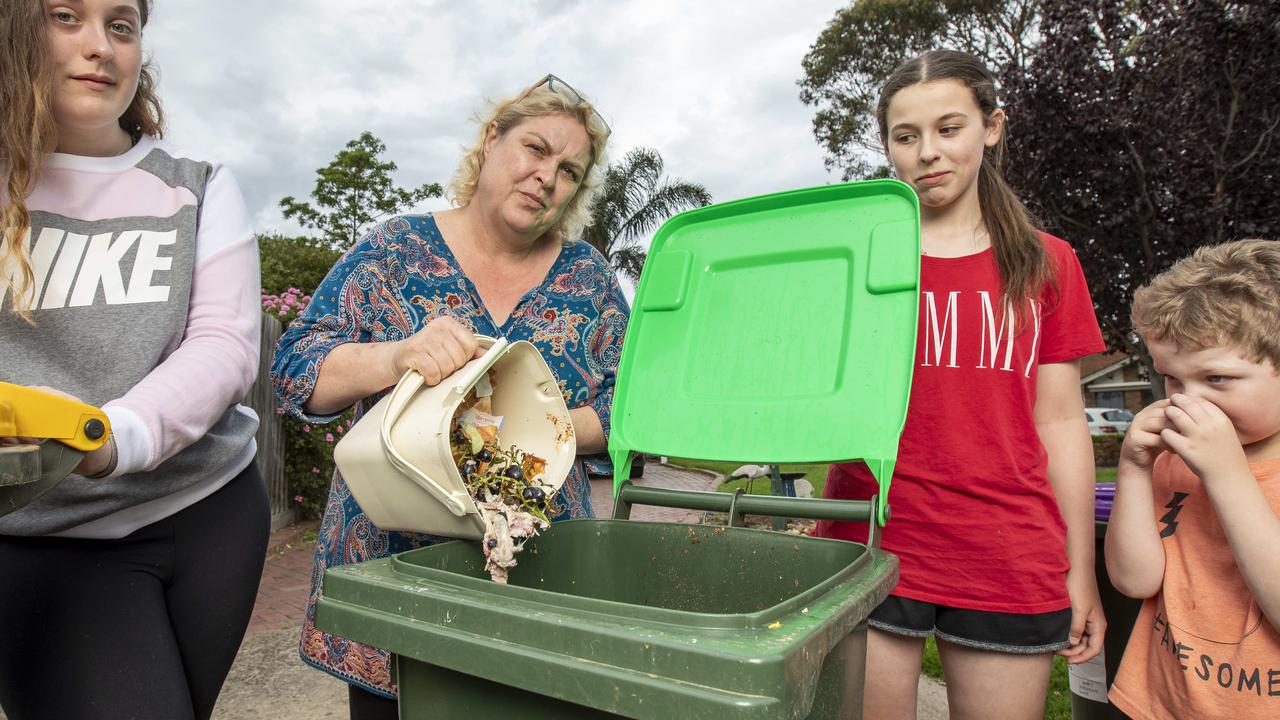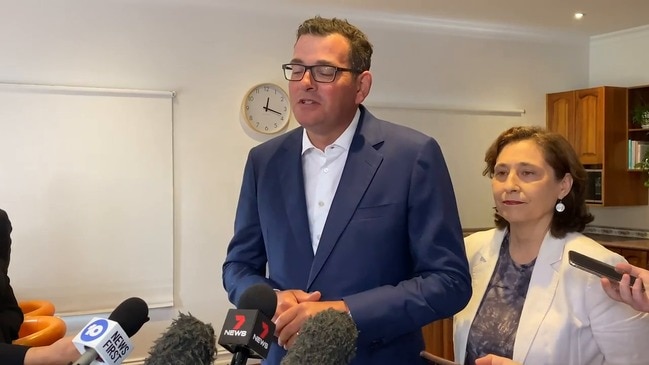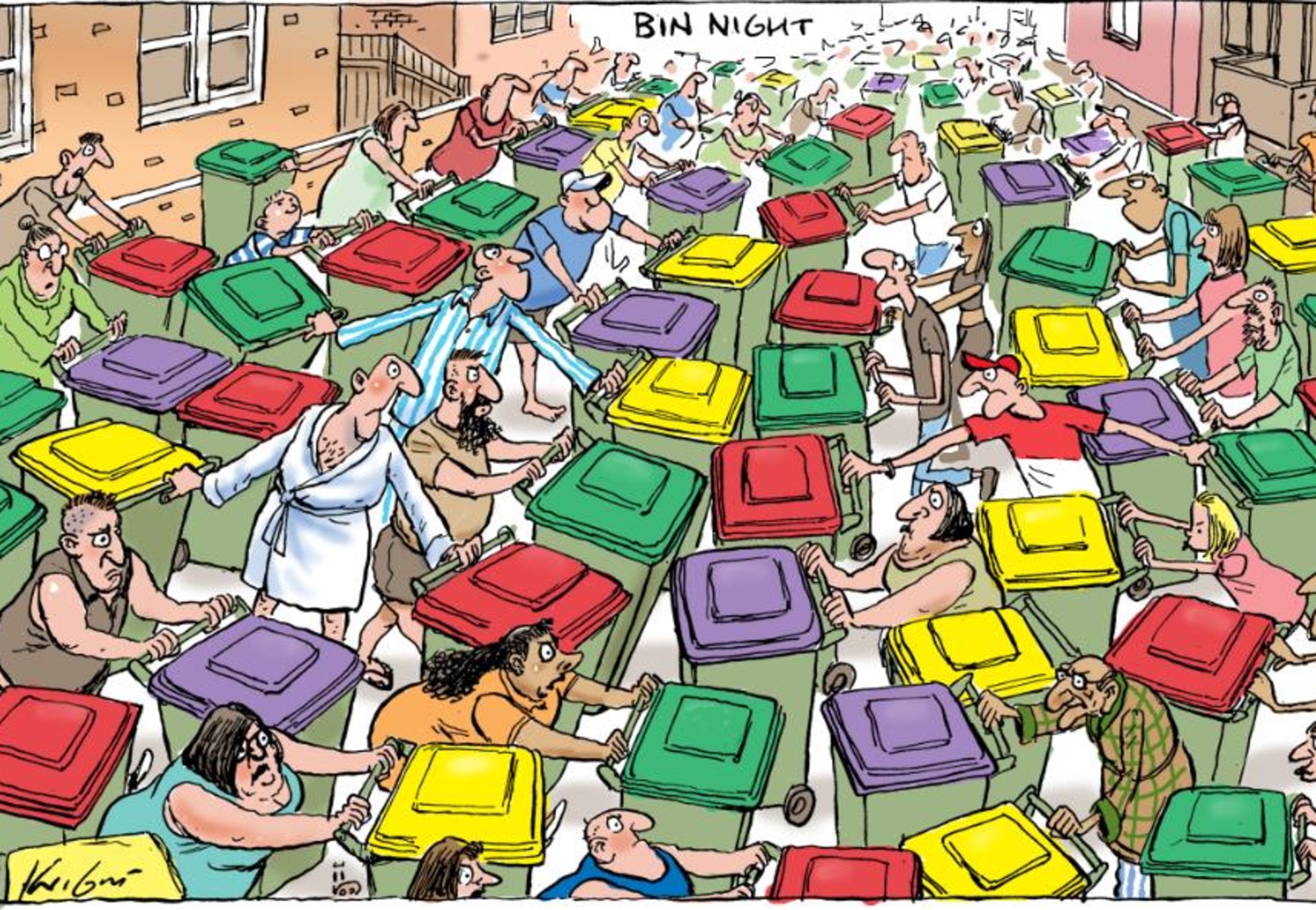Mark Knight: Waste management is a major issue in Australia and now it’s creating peak-hour traffic on bin night
In his weekly series, award-winning cartoonist Mark Knight looks at how waste management has become a major issue in Australia and why it’s soon to create peak-hour traffic on bin night

READING LEVEL: GREEN
As our population rapidly grows in Australia and our major cities experience an increase in high-density* living, the problem of dealing with our waste has become a major issue.
Once upon a time, everything went into big holes in the ground called landfill but gradually we have become smarter and adopted a culture of recycling*.
It makes sense to help the environment and provide a more sustainable* way to live, but also because we have a limited amount of resources on our planet and we should be looking to reuse material where we can.

State governments and suburban councils are responsible for the collection and the disposal of our rubbish. Most of us have had a rubbish bin and a recycle bin for years now. They’re not just things we use as a wicket when we play street cricket, they are the crucial* first step in waste management*.
But things were not as they seemed when it came to recycling our household goods.
We thought that when we put our bottles, cans, plastic products and old newspapers into the recycling bin that they would go off to be turned into new glass, plastic and steel products and recycled paper.

But in a lot of cases it was sent off to China for them to deal with. Then China stopped taking our recycle waste because it was contaminated* by other waste products.
Australian governments and councils had to get serious about the problem of waste and recycling. We would soon be drowning in it if they didn't!
This week the Victorian Government had a plan. The idea was that each household would have multiple recycling bins so our waste could be separated. A purple bin for glass. A yellow bin for paper, plastic and metal. A green bin for organic waste and a red one for landfill. That’s a lot of bins. I thought I should look at this in a cartoon!
Mark Knight’s cartoon. Right-click and open in new tab to see full size.

My immediate thought for a cartoon was “Where are we going to keep all theses bins?” And “What nights would they go out?”
This new system was not going to be easy and I wanted to illustrate the challenges of such a transition* in public behaviour.
The good thing about it was that neighbourhoods would be much more colourful with all those purple, red, yellow and green bins dotting the streets on bin night!
Drive down any suburban street when rubbish collection is due the next day and you will see a battalion* of multi-coloured bins standing to attention waiting to be emptied. Now we have more to add to that army.
Then the element of comedy came to me and I imagined everyone bringing out their bins at the same time (which is just after the evening meal usually).
I started drawing husbands in their dressing gowns wheeling out two bins at a time, women on a mission to get their bin in a desired collection space, kids doing it for mum and dad and son on until the street was full of people and hundreds of bins all battling for position.
It looked like a freeway at peak hour*.
The point about the scene in the cartoon was that ironically*, no garbage truck would ever be able get down that street to collect them!
But that doesn’t mean I’m against ideas for better management of our waste. The cartoonist in me though will be interested to see how it all works.
GLOSSARY
- high-density: lots of buildings
- recycling: the action or process of converting waste into reusable material
- sustainable: able to be maintained at a certain level for a long time
- crucial: important
- waste management: the collection, transportation, disposal or recycling and monitoring of waste
- contaminated: not pure either from pollution or poison
- transition: a period of change
- battalion: a large body of troops ready for battle
- peak hour: busiest time of day on the roads
- ironically: used in reference to an unexpected situation
EXTRA READING
Mark Knight: Aussie spirit front and centre at rock concert
3D printer making recycled plastic fantastic
World-first zero-waste flight takes off in Australia
QUICK QUIZ
- What colours will Victoria’s bins be?
- What will each colour be used for?
- Which country used to receive our recycling and why did it stop?
- What is landfill?
- What does Mark Knight describe as a battalion?
LISTEN TO OUR STORY
to come
CLASSROOM ACTIVITIES
1. Caption it!
Cartoonist Mark Knight has not used a caption on this cartoon, letting the imagery speak for itself.
Read Mark’s explanation of what the cartoon means again and write two, three or four short sentences, just to make sure you understand what the cartoon is saying.
Using your sentences to help you, write a caption for the cartoon or some thought bubbles or quotes from the people in the cartoon that will make Mark’s meaning clearer for children or people who haven’t been reading the news this week.
Time: allow at least 20 minutes to complete this activity
Curriculum links: English, Humanities, Visual Arts, Critical and Creative Thinking
2. Extension
Look through the most recent stories on Kids News and choose one to draw a cartoon about.
Use Mark’s three-step process to get started:
- What is my subject?
- What do I want to say about this issue?
- How do I say it? Do I use visual metaphors (an image that the viewer is meant to understand as a symbol for something else), multiple panels or symbolism (when one idea, feeling or emotion is represented by something else such as a: picture, character, colour or object)?
Time: allow at least 40 minutes to complete this activity
Curriculum links: English, Humanities, Visual Arts, Critical and Creative Thinking
VCOP ACTIVITY
After reading the article, with a partner, highlight all the openers you can find in blue. Discuss if they are powerful and varied openers or not. Why do you think the journalists have used a mix of simple and power openers? Would you change any, and why?
HAVE YOUR SAY: Should all Australian households should switch to four bins?
No one-word answers. Use full sentences to explain your thinking. No comments will show until approved by editors.

